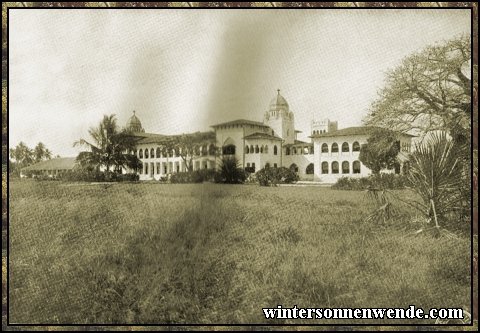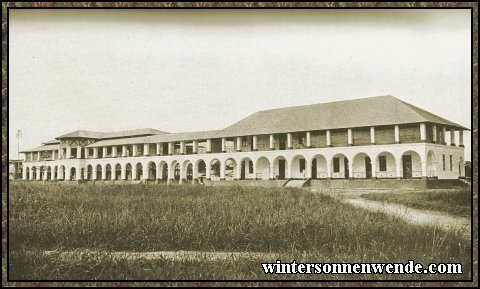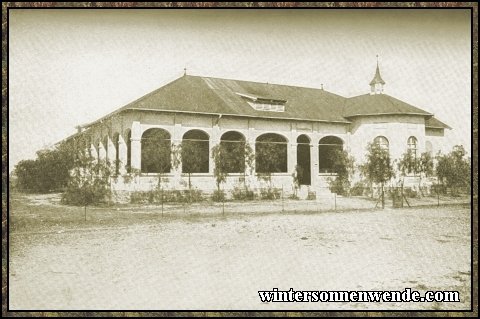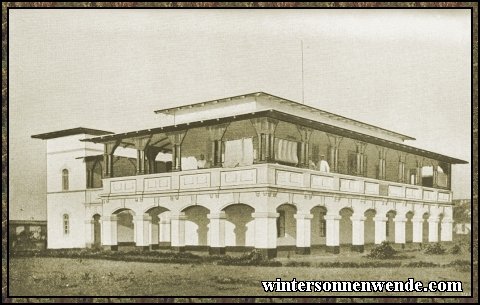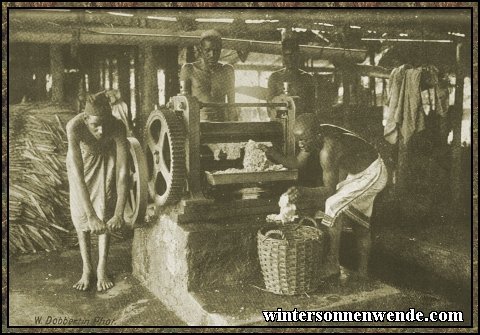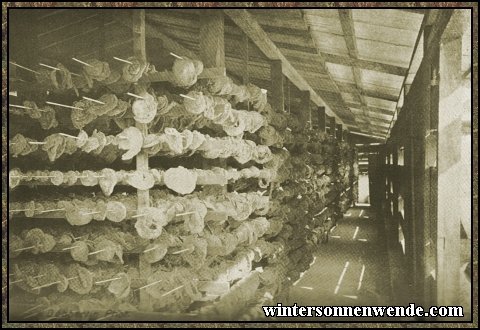 |
 The Question of Slavery and Forced Labour It still remains to investigate the allegation that indefensible restrictions were imposed on the liberty of the natives in the German colonies. In the propaganda of our enemies the conditions are so depicted as to give the idea that the institution of slavery among the natives in those colonies, in contrast to all other colonies, had been retained and that the Germans had even introduced a kind of forced labour which practically amounted to a condition of serfdom. It will suffice to establish a few facts in order to demolish the first of these two accusations - that pertaining to slavery. When Germany acquired her colonies the kidnapping of natives and the resulting trade in slaves were rampant in East as well as in West Africa. Both evils were abolished in the course of a few years through the energy and initiative of the German Government, though often only after stubborn struggles with the slave-dealers, especially in German East Africa through the suppression of the Arab revolt. On the other hand, a certain mild form of peonage which pertained to certain of the colonies was not immediately abolished. This restraint was exercised solely in order to avoid too sudden changes and to prevent positive injury to the native population, as well as injustice to the old domestic serfs who were incapable of securing new employment, and for whom their existing masters were pledged to provide. Provision was, however, made for the gradual abolition of this form of house peonage. Thus all children born of domestic serfs after a certain date (December 31, 1905, in German East Africa) were declared to be legally free, and their liberation was greatly facilitated through purchase by the serfs themselves or through emancipation by the authorities. This in a comparatively short time would have led to the complete abolition of peonage. In spite of this the German Reichstag in 1912 passed a resolution that domestic peonage in German East Africa was to cease for good on January 1, 1920. The Colonial [130] Office took measures for carrying out this decree and for protecting the masters and the serfs as far as possible from loss or damage. Had the World War not broken out, domestic peonage would have been abolished long before now. In the light of these facts, it is wilful and ungenerous misrepresentation to describe (as has been done) the recent Ordinance of the British in Tanganyika Territory (that part of German East Africa which Great Britain demanded under the Mandates), to the effect that no person may hold another as a slave against his will, as "an act of emancipation" and "a great humanitarian measure" of which the Germans would never have been capable. Moreover, this Ordinance, as was pointed out by Mr. Grimshaw in his report as representative of the International Labour Commission to the Permanent Mandate Committee of the League of Nations, has a more negative than positive character, since it still permits the existence of a voluntary system of peonage.1 With regard to the other German colonies now in alien hands, the aforementioned report does not convey the impression that anything of importance has been altered with respect to the traces of peonage still existing in those regions. Particularly worthy of note are the observations made in the report (based on a summary of all the Mandate reports) to the effect that peonage did not necessarily imply a worse treatment of serfs than was likely in the freedom enjoyed in present economic conditions, and that the serfs themselves manifested no general desire for formal emancipation. Here, again, it is possible to call the diplomatic representatives of Great Britain in Germany as witnesses in favour of our much-maligned colonial administration. Report after report sent to the British Foreign Office from the later years of last century (that is, ten or a dozen years after Germany began colonization) records the drastic measures taken for the suppression of slavery and the progress made in abolishing the milder institution of domestic serfage. Thus the British Embassy in Berlin reported in relation to East Africa in 1894:
[131] "It would appear that the German administration in East Africa has not interfered, to any great extent, with the prevailing customs in regard to domestic slavery, which is generally speaking of a mild form, and against which there is no movement amongst the slaves themselves. Domestic slaves are passed on from father to son, or to any lawful heir of the original owner. On the other hand, very stringent measures are taken to suppress slave raiding and dealing. Any Arabs or natives caught flagrante delicto are condemned to death."2 A report to the London Foreign Office on the Cameroons for 1897 stated:
"Slavery has lost ground on the coast and so far as the power of the Government extends. The natives (and especially the Duallas) seem to adopt the point of view of Europeans in this respect with wonderful quickness, and as an instance may be cited the election of a former slave to the post of arbiter on the arbitration court composed of the most important of the Dualla chiefs." Again, on the same colony it was reported in 1900:
"Slavery has entirely disappeared in all the region immediately under German control, and it is stated that not a single case of the sale or purchase of a slave from the interior of the Cameroons littoral has been noted between 1895 and 1899. The Government will not be able to entirely suppress the slave trade in the interior until the country has been subjugated."3 A later report on East Africa stated :
"The institution of slavery is, however, clearly dying out in German East Africa, and will disappear when the country is provided with better means of communication. A decree of the Imperial Chancellor issued in December, 1904, provides that all children of slaves born after December 31, 1905, are free."4 In these circumstances it is certainly difficult to justify [132] any reproach being made against the German colonial administration for having gone carefully and gradually about the work of suppressing the remaining fragments of this mild form of serfdom, with a view to abolishing them with reasonable consideration for the ancient customs and existing economic needs of the natives. Besides, similar conditions prevailed in the colonies of other European Powers and are being gradually supplanted there in a precisely similar manner. Those English critics who try to make out that Germany upheld slavery in her colonies might be well advised to remember the adage about stone-throwing in glass houses. Having defended my own Government against unjust and uncharitable aspersions, I am not unmindful that a British Government cannot always do at once all it might like in such a matter. Long after Germany had begun her earnest crusade against slavery in East Africa the practice continued in a British territory in that part of the continent. Sir Charles Eliot wrote in 1905, in his book The East African Protectorate (of which territory he was the British Administrator):
"The position of our East African possessions with regard to slavery is somewhat peculiar. They are founded on the suppression of slavery... yet by a strange combination of circumstances the East African Protectorate is severely, and not altogether unjustly, criticized for maintaining and tolerating slavery at the present day. The facts of the case are that, owing to the promises which we made to the Arabs when we took over the coast, slavery is recognized as legal within the Sultan's (Zanzibar) dominions - that is, in a strip ten miles wide along the coast.... The contrast is certainly unfortunate, and illustrates what foreigners call our hypocrisy" (pp. 233-4). I do not myself apply the hard word just quoted, but merely remind the reader that the best of Governments cannot always roughly override circumstances, but may have to tolerate evils longer than they wish from a fear of inducing worse ills by indiscriminate and precipitate action. It is equally justifiable to remind our critics that so late as 1921 slaves were allowed to be recaptured and re-enslaved within the precincts of the British Legation at Adis Abeba, the capital of Abyssinia, and [133] that the British Foreign Office refrained from protests until the abuse became a public scandal. I quote from the reports of English eye-witnesses:
"Abyssinia is the last home of open slavery. In its capital, Adis Abeba, there are more slaves than free men. The British Legation itself is full of slaves, owned by the Legation servants, who would not take service if they were not allowed to bring their chattels with them. The Legation compound is British soil, yet not only do slaves who enter it not become instantly free, but if they have escaped from their owners, their owners can and do enter it without hindrance to recapture them. That is an odd enough fact, but a still odder one is that a great many of these slaves are British subjects captured by slave raids into British territory." These writers continue:
"Gangs of slaves, marching in misery, the men chained together in rows, and the women and children dragging themselves along beside the main body, can be seen by any traveller in Southern Abyssinia to-day. Some of these slaves are captured in Abyssinian territory, others in British East Africa, others in Anglo-Egyptian Soudan. One of the writers of these articles has seen with his own eyes a convoy of ten thousand slaves marching towards the great slave market of Jimma; and in the course of a single day's march along the trail he has counted the dead and dying bodies of more than fifty captives who have dropped by the roadside.... These things we have seen. And we have seen also hundreds of square miles of territory utterly depopulated by Abyssinian raids. Most of this territory is within the confines of the Abyssinian Empire, but part of it is within the British Empire. The facts are not unknown to the British Foreign Office."5 Remembering the revival, by English pamphleteers, of so many refuted and recanted slanders against German colonial administration, I would not suggest that the evils here spoken of have gone unremedied, though no later information is in [134] my possession. The crucial point, however, is that while the seizure of Germany's colonies has been excused by what took place many years ago, the incidents and conditions above narrated refer to yesterday. It is equally pertinent to mention the later scandal of the sale of girls in Hong Kong which led to a protest conference in London in February, 1922. It was stated by the English Anti-Slavery Society that it was estimated that no fewer than 50,000 girls were at that time held in bondage in that British territory. The most important publication with reference to the alleged existence of forced labour in the German colonies is the Open Letter addressed by Bishop Frank Weston, then of the English University Mission for Zanzibar and East Africa, to General Smuts. This letter was written during the war, and it was later included in the form of an appendix in the aforementioned collection of calumnies published by Evans Lewin. The title of the Open Letter in the English edition is "The Black Slaves of Prussia," and in the German edition "Das Martyrium der Eingeborenen" ("The Martyrdom of the Natives"). The Bishop himself has since explained to the world, in a booklet published in 1919 entitled The Serfs of Great Britain, being a sequel to "The Black Slaves of Prussia," how this document came to be published. In the course of this statement he says:
"When I wrote my Open Letter to General Smuts, I called it 'Great Britain's Scrap of Paper: Will she honour it?' I was alluding to her promise of justice to the weaker peoples. The Imperial Government took my letter, cut out some inconvenient passages, and published it under the title 'The Black Slaves of Prussia.' I suggest that East Africans have now become 'The Black Serfs of Great Britain.'" The reader is asked to weigh the words put in italics. They afford a not very creditable illustration of the way in which the nefarious propagandism aimed against Germany was machined. The Open Letter contains a reproach against the German East African Government for having instituted forced labour. But both pamphlets show that the Bishop disagrees, for [135] Christian and humane reasons, with the system followed by the British and Germans alike in the sphere of black labour. In the later pamphlet he attacks the British regulations issued in 1919 for Zanzibar and British East Africa, providing that there should be forced labour for public works and that work on private plantations should be furthered by semi-compulsion (sometimes euphemistically called "encouragement") of the natives. The Bishop makes this attack with the same energy which he expended in his first pamphlet upon the conditions in German East Africa, conditions which in his opinion amounted to forced labour. He says:
"Great Britain is doing with its Africans what Lenin and Trotsky are said to do with the Russians. It is ordering a conscription of citizens for labour. Also, it is placing the resources of the Government at the service of a small band of European settlers." These two extracts clearly show that the question at issue is essentially one of different points of view - the irresponsible personal and private view as opposed to the responsible official, the purely humanitarian and democratic view as opposed to the administrative and economic. The difference is explained by the fact that the humanitarian is free to advocate ideal theories, while the administrator has to pay regard to the actual facts and conditions of practical life as he finds them. The English Bishop is opposed to any kind of forced labour for natives, whereas the administrations of all colonizing nations apply the principle of forced labour when public works are in question, and stimulate the natives in every practicable way to the performance of useful tasks. The principles followed in the German colonies were similar to those laid down on several occasions by Joseph Chamberlain, when Colonial Secretary. He stated in the House of Commons on August 6, 1901:
"I believe it is good for the native to be industrious, and we must bend every effort to teach him to work.... There never was a people in the whole course of history which did not work. In the interests of the natives of all Africa, we must teach them to work." Again, speaking in the same place on March 24, 1903, he said:
"I continue to believe that under all circumstances the progress of the [136] natives towards civilization is only secured when they shall be convinced of the necessity and dignity of labour; and therefore I think that everything we can reasonably do to encourage the natives to work is highly desirable." The part of Bishop Frank Weston's pamphlet against German East African administration which accuses the Germans of employing forced labour for private work and advances other allegations against them has been answered in a most convincing manner by Baron von Rechenberg, who was my immediate predecessor in German East Africa, in his pamphlet German Colonial Policy before the Bar of the World (1918, p. 36). Everyone in East Africa knows that Baron von Rechenberg, whom Bishop Weston himself in his pamphlet calls "one of the best and most humane functionaries," was the most active opponent of such forced labour during the whole of his six years of office in German East Africa - from 1906 to 1912. The Secretary of State for the Colonies also maintained his opposition, in the face of demands from various sides, against the natives being forced to work on the plantations. Regulations opposed to such demands, and definitely protecting the natives against forced labour, were actually put into effect. This action, however, did not interfere with the encouragement of the native to useful work and his receiving instruction to that end. Curses have a strange way of coming home to roost. Here, again, it is easy to turn the tables upon our accusers. At the present time, as discussions in the British House of Commons and Government papers show, the white authorities and traders of British Kenya are hankering for forced labour for the plantations, and wish to get rid of the obligation to obtain the British Colonial Secretary's sanction to the same.6 The Nairobi correspondent of The Times of July 30, 1925, reported that a number of natives who refused to work on a railway had been arrested and either fined or imprisoned. As the convictions were illegal, they were subsequently quashed and the fines were ordered to be returned, but there is no mention in the [137] report of any compensation being paid to the natives who were wrongfully kept in prison for a fortnight before being tried. It is fair to add that the home Government has firmly insisted that the consent of the Colonial Secretary shall be obtained before "compulsory recruitment" (i.e. forced labour) can be resorted to, and has stipulated that such consent will only be given for specified works and for definite periods.7 How British settlers, living at present under the changed conditions in German East Africa, judge of German achievements in that colony as compared with those under the Mandate administration, is plainly to be seen from an article in the Dar-es-Salam Times of March 4, 1922. The passage runs as follows:
"This journal has pointed out ad nauseam that the native cannot be expected to develop the country by himself. He needs European guidance and co-operation. One is forced to say that he was happiest when the Germans went in for agricultural enterprise and development, providing him with work, money and food, at the same time instructing those who were interested in more modern methods of agriculture than they had hitherto met with. Since our occupation, agriculture has languished. European enterprise has been far from encouraged, and the result is a generally poverty-stricken and dissatisfied native populace." In view of such impartial evidence, what answer is needed to the suggestion conveyed by the Note to the Versailles Treaty, that the various forms of forced labour (whether by themselves or in conjunction with the aforementioned "cruel oppressions" and "arbitrary requisitions" is not quite clear) have "depopulated wide stretches in East Africa," and also in the Cameroons, to which we shall return later? The principal witness cited in all these publications is a Dutch priest, [138] Pater van der Burgt, who lived in the interior and complained that not a third of the labourers recruited for work on the plantations ever returned. The statement itself was justified. The cause, however, was not due to the depopulation of German East Africa through the death of the natives, but to the development of transport, trade, and agriculture. Many natives preferred to live in the settled localities near the railway or larger settlements, rather than in their remote original homes, to be reached only after weeks of marching. But now mark the sequel. The same Pater van der Burgt, in an interview on November 11, 1918, repudiated the false ideas and impressions which had been artificially created by tearing a few of his sentences from their context.8 He then formulated his judgment thus: "German colonization in German East Africa was the greatest of blessings both for the country and the people." He also declared that the terms made use of by the official anti-German propagandists, such as "modern slavery," "forced labour," and so on, were fraudulent. Yet - will it be credited? - not one of the writers or publishers of the pamphlets in which an attempt is made to justify the violent filching of the German colonies has mentioned in any later edition this repudiation of the Pater's. It is by such suppression of facts that this cruel wrong has been done to Germany. The fact is that there exists no evidence at all to show that any decrease of the native population has occurred under German rule in German East Africa. I myself regard any such decrease as highly improbable, and I base my opinion upon a knowledge of the native population gained in the course of frequent journeys to and fro over almost the entire territory. The blacks of East Africa are in the main a strong and virile race. The conditions which formerly caused such great mortality had practically ceased to exist under German rule. The constant internecine feuds of the tribes had ceased. Plagues, such as smallpox, which formerly carried off the greatest number of victims, had been effectually combated; and when a famine happened to occur, the administration was [139] at once at hand with relief measures. The native labourers were protected in an ever-growing degree by splendid sanitary arrangements and hospitals well staffed with skilled German doctors and attendants. Instead of decreasing, it is probable that the native population was on the increase during the years preceding the war. It is impossible to furnish definite proof of this, since the census had not been taken with any great accuracy. It was only after the war had been illegally carried into the colonies, in violation of the Congo Act, that the negroes of German East Africa began to suffer serious losses. These were occasioned directly by fighting and privation, but also indirectly, and probably to a far greater extent, through the outbreak of plagues and pestilence, due to the enforced cessation of all the preventive and sanitary measures which had been applied by the Germans with such notable success.
In the Cameroons the Germans are also reproached for having, as is alleged, caused a decimation of the population through forced labour. This charge likewise is absolutely unwarranted. Forced labour was employed in the Cameroons, just as in the other colonies, only when it was a question of executing public works. For all other undertakings volunteers, who were recruited by private agents, were employed. In the propagandist booklets, much is made of the comparatively high mortality rate on certain plantations. It is true that the death-rate among the native labourers was at times regrettably high. The reason for this was twofold. In the first place, most of the plantations were situated in the unhealthy coast regions of the Cameroons, where epidemics were frequent, and secondly, when natives from the high-lying, healthy regions in the interior were employed, they fell easy victims to the fevers prevailing in the low-lying districts. Similar experiences were made in other colonies - not only in the German territories, but wherever the experiment was tried of utilizing natives from the higher regions in the climatically more unfavourable plantations. Here let it be said in passing that the Report of the Permanent Mandates Commission of the League of Nations clearly shows that even under the present Mandate government of the German colonies similar [140] regrettable results have followed upon attempts made to transplant the native workers from their homes to regions with different climatic conditions.9 It should be noted, however, that in the Cameroons in particular extraordinary efforts had been made in the matter of caring for the health of the native labourers. Hospitals and doctors were there in abundance; and regulations for the well-being of the natives had been issued, obliging the larger European plantations to make sufficient medical provision in proportion to the number of workmen employed, including a staff of trained hospital attendants. The apparent depopulation of certain districts in the Cameroons was due, not to work on the plantations, but to another cause altogether. Whether the propagandists who were directed to defend the annexation of the German colonies by pamphlets knew the actual facts or not I cannot say, but if they did not the immorality of employing ignorant writers in such an agitation is self-evident. The actual cause was the exploitation of the wild-rubber trees growing in one part of the colony. This exploitation led to undue demands being made upon the natives living on or near the caravan routes affected. These men were required as carriers and also to attend to the needs of passing caravans, and this work engaged them to such a degree as to threaten their family life. The result was that the natives sought to avoid the constant disturbances and the work caused by the passing caravans by moving away from the neighbourhood. These then tended to become deserts, not on account of the population dying off, but on account of it moving away. The German colonial administration was decidedly opposed to these abuses and had taken measures designed to place the economic existence and family life of the natives on a securer basis than that afforded by the exploitation of the wild rubber. In any case, as the supply of wild rubber was gradually becoming exhausted, the exploitation of the rubber could not be a permanent occupation. [141] It is certainly true that this exploitation, with the accompanying effects of a tremendous growth of the caravan service and of the demand for carriers, was at times a severe burden to a part of the native population. Yet the administration did all in its power to remedy and alleviate the evil and find other employment for the blacks. If the wild-rubber districts of the Cameroons be compared with the wild-rubber districts of other West African colonies, the German colony gains greatly by the comparison. No one ever heard of "red rubber" in the German colonies, nor of forcing the natives by means of bloody outrages to deliver ever larger quantities of the coveted rubber. No black was ever murdered or crippled in the Cameroons, as were hundreds in the Congo regions, simply because the hapless wretches did not supply sufficient rubber to their avaricious masters. In the German colonies, in a word, there were none of the atrocities which were perpetrated for years in the neighbouring French and Belgian territories until the conscience of the entire civilized world demanded their cessation. Yet to-day France and Belgium are in possession of German territories in virtue of violent seizure and in violation of the conditions of peace accepted by Germany at the instance of the American Government.
What has been said of German East Africa with respect to the alleged depopulation applies no less to the Cameroons. The native population trekked from one region to another. Any general decrease in the sum total of the population, however, cannot be proved and it is also highly improbable. According to the observations and notes made by the last Governor of the Cameroons, Governor Ebermaier, in the course of his many journeys through the colony, it may be asserted with certainty that the number of natives in the Cameroons immediately before the war was considerably higher than had been stated in former official reports. The losses occasioned in the territory by the war and the serious disadvantages caused by the absence of the German measures for combating disease and pestilence have not been remedied by the Mandate Government, which can show nothing comparable to the efficient [142] German medical organization, as is frankly admitted by visitors to the colony. Some more specific observations must be added regarding the labour conditions in the German colonies under Mandate administration. The first thing that must be made clear is that the system of forced labour for public works has been retained everywhere. The reports to the League of Nations of the Mandate Governments between which the Cameroons have been divided, i.e. those of France and Great Britain, contain some remarkable statements as to labour conditions. The French report calls attention to the fact that in the French section of the Cameroons certain difficulties arise because "the natives of Equatorial Africa neither feel the need for work nor the wish to work, nor have they any taste for it." The separate reports upon the same tribe in the British section of the colony reveal quite a different aspect. There "the continued operation of the large European plantations is secured in a most satisfactory way by more than 10,000 labourers, who keep the work going by their own efforts.... Not one of these labourers is bound by a long-term contract, or indeed by a contract of any kind. On the contrary, each is free to go away when he chooses."10 It is scarcely necessary to point out that the arbitrary frontier division between the British and French sections, a frontier line which divides tribes in two, cannot be the cause of such a totally divergent attitude of the natives towards their work. The "joy in work" displayed by the 10,000 labourers in the second report can be explained only by the employment of some means, not mentioned in the text, of making labour appear desirable to the negroes. It should also be remarked as to the French part of the Cameroons that apart from the compulsory military service now introduced therein, as already mentioned, and the employment of soldiers for service outside the colony, the lot of the natives under the French Mandate was rendered considerably more unfavourable by the circumstance that according [143] to the French official report for 192111 the recruiting of labourers for undertakings outside the territory is granted if the permission of the head of the territory is obtained. Thus it becomes possible for the French to utilize natives from the Cameroons for the unhealthy territories, with deplorable sanitary conditions, which are owned by French concessionary companies in the regions of the Congo and the Ubangi. It should be added that the League of Nations Secretariate published in the present year (1925) the report of a Committee which had been appointed to investigate the subject of slavery. In this document it is stated that serfdom still prevails in the French colonies of tropical Africa as well as in the British possessions of Burma and Assam. Yet the Committee "hesitates, for economic reasons, to recommend the compulsory liberation of all serfs," and only proposes that serfdom should be declared to have no legal status and serfs be able to free themselves, if they wished, without expense. The Committee even defends the employment of forced labour on public works and the coercion of the native labourer to work as an "educative measure." How weak and apologetic such recommendations look when compared with the mock morality of the accusations made during the war against Germany in regard to both these questions, on which she had already gone farther in her colonies than the League of Nations and some of her accusers are prepared to go even to-day!

2Cf. Foreign Office Report on German Colonies for 1894, No. 346 (C 7582-7), pp. 34-44. ...back... 3Ibid., No. 528, June, 1900. ...back... 4Ibid., No. 3519, for 1903-4. ...back... 5Slave-trading and Slave-owning in Abyssinia (reprinted from the Westminster Gazette by the Anti-Slavery and Aborigines Protection Society [1922]). ...back... 6The episode is dealt with in an official White Paper (Cmd. 2464) issued in London in July, 1925. ...back... 7Forced labour of another kind has since been reported from South Africa. The Cape Argus of May 30, 1925, published a paragraph from Johannesburg entitled "Persecuted Bushmen," stating: "Dr. C. M. Doke, the well-known expert on native affairs, declared in a lecture at the Y.M.C.A. last night, that Kalahari Bushmen are being captured in raids and compelled to work in farmers' fields. The lecturer alleged that even to-day in Angola Bushmen were being hunted and persecuted." ...back... 8Professor Brinckmann, "Eine Unterredung mit Pater van der Burgt," in the Koloniale Rundschau (1918), p. 437. ...back... 9Cf. Commission permanente des Mandats: Rapport sur les travaux de la troisième session de la commission présente au Conseil de la Société des Nations du 20 juillet au 10 août, 1923, p. 2, No. 3. ...back... 10Commission permanente des Mandats: Annexes aus procès-verbaux de la 3e Session tenue à Genève du 20 juillet au 10 août, 1923, p. 269. ...back... 11Rapport au Ministre des Colonies sur l'administration des territoires occupés du Cameroun pendant l'année 1921 (Paris, 1922). ...back...
|






